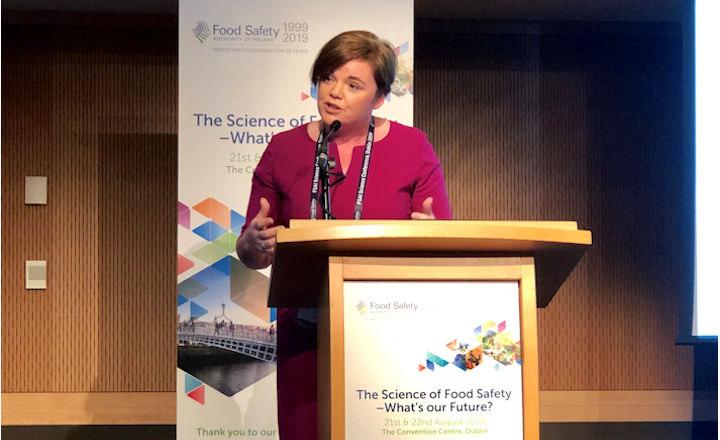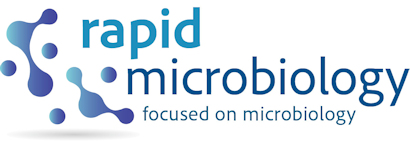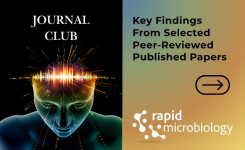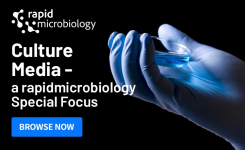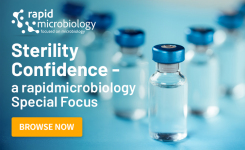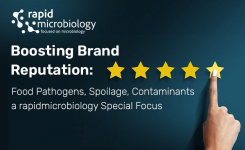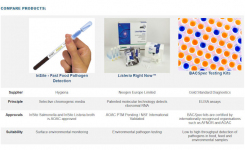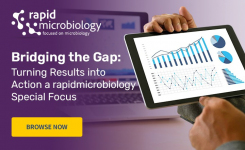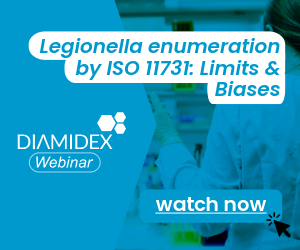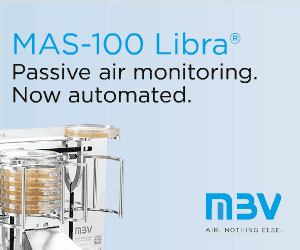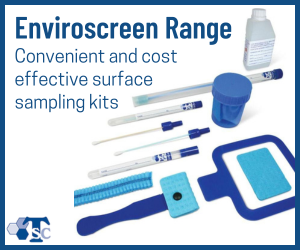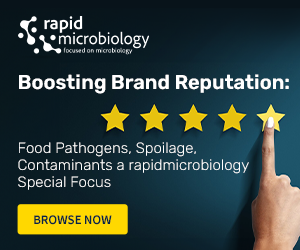How does Ireland, a tiny island on the outskirts of western Europe become a leader in Europe's food safety and ranked 2nd in the Global Food Safety Index (2019)?
Ireland's food produce is in 180 countries around the world and set up Europe's first food safety agency, The Food Safety Authority of Ireland (FSAI). For the past 20 years, since its inception, the FSAI has managed to raise Ireland's profile as a country with high food safety standards and expertise that is continually sought for in the world's food industry.
In this interview, FSAI CEO Dr Pamela Byrne, discusses with rapidmicrobiology the FSAI's involvement in international food safety affairs, preparing for a COVID-19-like crisis in the food industry, and how vetting data they capture and process is fundamental in risk management and the country's preparedness.
Q. How does World Food Safety Day help FSAI raise awareness on the importance of food safety?
Pamela: We were delighted when there was a designated date in the calendar, that everyone can focus on food safety. Food safety is critically important, from where food is produced on the farm or at sea, right through to the consumer. It provides us, as a state agency, with a unique opportunity to raise awareness of the importance of food safety across government departments, the industry and the public.
Q. What will be the theme of this year's FSAI World Food Safety Day event?
Pamela: We will work with the Department of Health and the Department of Agriculture, and SafeFood, our north-south ministerial body, to raise awareness of Campylobacter in chicken, with the message of the risks associated with washing chicken.
We believe the message is essential, and we know that you can't be complacent when it comes to food safety. The FSAI are noticing an increase in the number of Campylobacteriosis cases in humans over the last number of years and an increase in the prevalence of Campylobacter on poultry products.
We will seek to expand this year's message to include the importance of maintaining hygiene, particularly as COVID-19 has become an issue. Our message to consumers is that you can take action yourself by minimizing the risk.
The industry is responsible for the safety of food, and as regulators, our job is to verify they are putting safe food on the market, but we can't get rid of some pathogens from the environment. And with a harmful pathogen such as Campylobacter, we need to take precautions by informing the public of how to minimize the risk of infection, by not washing chicken.
Q. How does the FSAI collect data on food safety risks?
Pamela: We are a regulatory enforcement agency that uses science to inform our decision making. So we must have access to accurate and timely information we can trust.
We have many data sources around the world, but we need to consider the data, when making decisions, to minimize the risk to the consumer. Therefore, we need to be strategic in how we capture and process that data and be sure it's of high quality and comes from a reliable source.
In some cases, we may need to take enforcement action, like recall a product or withdraw it from the market. We may also use data to develop a training resource or provide guidance to the industry to understand and apply the law.
If we don't fully understand how the food became contaminated, we would carry out inspections and collect samples to be analyzed by an accredited laboratory. Then these results would inform our actions on how to minimize risk to the consumer.
Q. What are 'advanced information systems' in FSAI's 2019-2023 strategic plan?
Pamela: We have invested a lot over the last number of years, building up our internal infrastructure and its capacity to capture and process data. However, an area where we can never invest in enough is in the area of new and emerging risks.
The world has dealt with variations of coronavirus on several occasions over the last 15-20 years, but COVID-19 is a new virus, that we have to adapt to and the data we gather for epidemiology and modelling is important so that we can understand how the virus behaves and any risks it poses. COVID 19 is not a food safety risk based on the current information we have available.
If we are complacent about food safety, an outbreak or contamination of the food could occur. Foodborne pathogens can evolve, reproduce at an unbelievable rate, and so can create a food crisis.
Therefore, we have to be prepared, and crisis preparedness is something we are always working on. This requires sound information systems and protocols to be in place.
We have carried out simulation exercises, where we've tested our ability to react in a situation and what we learn from this is built into how we will behave and respond in the future, and this helps to advance our response systems.
Q. What sort of information framework exists between countries?
Pamela: Ireland exports into 180 markets worldwide, and we need to make sure we are protecting our reputation by protecting consumers of Irish food. So, the decisions we make require working very closely with our international colleagues.
As a regulatory authority, and a member state of the European Union, we are a contact point for the rapid alert system for food and feed (RASFF) in Europe. If there is a safety issue or an incident that happens in any country in the EU or any country that trades with EU, member states are alerted to that issue. EU legislation requires information to be put into this digital-based system, and we are required to take action.
We're also connected into the World Health Organization's global system for food safety INFOSAN, and FSAI is the contact point in Ireland, for that system. Even if we are not trading with a country where there is an issue, we receive an alert, and we carry out a risk assessment and make a decision based on that.
Ideally, it would be great if all the information came into one source, and we could all extract value from it, but unfortunately, that isn't the case. And I think we have a long way to go for that to be in place.
Perhaps COVID-19 might encourage people to share data, thereby allowing countries to be better able to handle risk.
There is also the European Food Safety Authority (EFSA's) Emerging Risks Exchange Network, which is a science-based activity and Wayne Anderson, FSAI's Food Science and Standards Director, is involved in that Network along with our European counterparts. So, if there is an emerging risk in another country, we would hear about it and be able to assess the risk.
Q. Where does Ireland stand in comparison to other countries in regards to food safety?
Pamela: We have very high standards, and an excellent reputation and the fact that we are in 180 countries is evidence of that. The Departments of Agriculture and Foreign Affairs have worked hard to open up these markets over the last number of years, and a core requirement for market access is safe food.
We are also invited to many international conferences as keynote speakers. For example, I recently co-convened along with my counterparts from the Food Standards Australia New Zealand (FSANZ) and the Food Safety Agency in Saudi Arabia, the 1st global meeting of the 'Heads of Food Safety Agencies', which is chaired by Saudi Arabia.
The US FDA comes to Ireland regularly to carry out audits at premises that produce food for the US market, and we perform very well in these, but I would say there is always room for improvement.
We are also establishing a new framework in line with the recent EU Official Controls Legislation (https://ec.europa.eu/food/safety/official_controls/legislation_en). In our strategy, we are aiming for a world-class system that protects our consumers both at home and abroad.
Last year we were ranked 2nd in the Global Food Security Index for our food safety and quality (https://foodsecurityindex.eiu.com/Index). But there is no room for complacency where food safety is concerned, and there is always room for improvement.
Q. What work has FSAI done with international food safety agencies?
Pamela: We were the first food safety authority to be set up in the European Union, on foot of the BSE crisis, and are now in our 21st year of operation. During this time, we have worked hard to build up our international network. This allows us to share our science and knowledge and learn from others and to adapt our systems to best practice.
Collaboration is key to how we've engaged with stakeholders in other countries. We've worked with Irish Aid; we have hosted delegations from many countries that are developing their food safety control systems such as Bangladesh and Vietnam.
Last year, the FSAI, the Department of Agriculture and the Finnish Food Authority, submitted a proposal to the EU to support Albania, an EU ascension state, to build its food safety capacity and we were successful in receiving funding for a four-year project. The project was going into its 2nd year when the COVID-19 crisis began, and so our team came home. But we still maintain virtual communication with Albania, and even though the project might be delayed, we are determined to keep our commitment to them.


